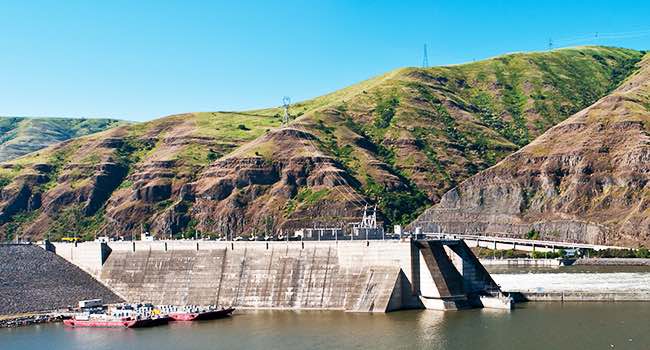forum
library
tutorial
contact

Orca Task Force Recommends
New Look at Snake River Dams
by Don Jenkins
Capital Press, November 19, 2018
|
the film forum library tutorial contact |

|
Orca Task Force Recommends
by Don Jenkins
|
A Washington task force recommends 36 ways to help orcas;
Farm Bureau likes some ideas, dislikes talk of removing dams
 Adding 10 orcas to Puget Sound over the next decade will require more fish habitat and possibly removing four Lower Snake River dams, according to a report released Nov. 16 by a governor's task force.
Adding 10 orcas to Puget Sound over the next decade will require more fish habitat and possibly removing four Lower Snake River dams, according to a report released Nov. 16 by a governor's task force.
The Washington Farm Bureau was one of six organizations on the 47-member task force that abstained from voting to send the report to Gov. Jay Inslee. The Farm Bureau couldn't endorse some of the report's 36 proposals, including taking another look at removing Ice Harbor, Lower Monumental, Little Goose and Lower Granite dams, director of government relations Tom Davis said.
"That's a non-starter for us," he said. "It just prolongs the conversation."
The task force, which will continue to meet, responds to a decline in the number of killer whales that feed off the Washington coast and near the San Juan Islands. The population peaked at 98 in 1995. The number has dropped to 74. The state goal is to have 84 by 2028.
Biologists blame the population decline on pollution, disturbance from vessels and a lack of fish, particularly Chinook salmon. Also, orcas must share salmon with a growing number of federally protected marine mammals.
The recommendations include suspending whale-watching tours for three to five years. The Pacific Whale Watching Association was the only group that voted to outright reject the report.
Davis said the Farm Bureau supports recommendations such as increasing hatchery production and studying how sea lions and harbor seals are affecting orcas. The bureau, however, objected to other recommendations besides possibly removing dams. Those recommendations included looking at spilling more water over dams and further restricting construction in and near water.
"We support the recovery of the orcas and there were a bunch of things we could support, so we didn't want to outright reject (the report)," Davis said. "We're concerned this is going to cast a wide net and pull in ag where it doesn't belong."
The task force suggested the state find a new source of money to fund orca-saving projects, though it didn't present any ideas. The task force also didn't put price tags on recommendations. Fully funding some proposals would require major expenditures.
The big-tickets projects would include a variety of habitat projects, including some that depend on breaching dikes and flooding what has been farmland. The recommendation will increase pressure to use more land to rear salmon, said Todd Myers, environmental director of the Washington Policy Center, a free-market think tank.
"I don't think there is any doubt about it. The question is, Can we do it in a way that works for fish and farmers?" he said.
Myers criticized the recommendation to convene another group to study breaching the Snake River dams, which are the subject of an ongoing federal review. Environmentalists argue removing the dams would quickly enhance fish runs. Farm groups and others defend the dams as important for barging grain and for generating electricity.
The task force called for hiring a "third-party neutral" to "establish a tribal and stakeholder process" to discuss removing the dams.
Myers said the discussions would be dominated by politics and self-interest, not science.
"I can tell you right now if you ask whale-watching operators if dams should be removed or whale-watching banned, the answer is not going to have anything to do with science," he said.
Defenders of Wildlife said in a statement that the recommendations were good, but not bold enough to save orcas from extinction.
"We must quickly and aggressively remove outdated and unneeded dams. We must fully protect and restore our rivers and floodplains, which includes limiting and removing harmful construction projects," the group's Northwest representative, Robb Krehbiel, said in a written statement.
The task force's 36th recommendation is to reconvene in 2019 and address whatever it missed.
"We'll really have to be in a defensive mode next year," Davis said.
House Agriculture and National Resources Committee Chairman Brian Blake, one of three legislators on the task force, said he voted to send the report to the governor, though he didn't agree with all the recommendations.
Many of the recommendations will require approval from lawmakers. "There will be a discussion about how ag is treated," said Blake, D-Aberdeen.
learn more on topics covered in the film
see the video
read the script
learn the songs
discussion forum
